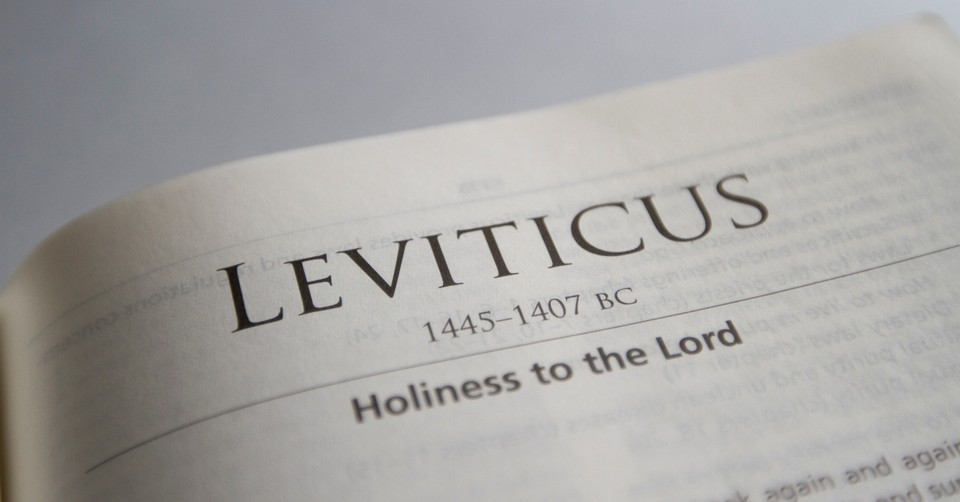Why Christians Should Read the Book of Leviticus

There are some books in the Bible that get overlooked. maybe, they are, indeed, hard to understand in our context. Or, as some critics have complained, “There is just too much blood in the book.” Someone might even dare to utter out loud what some whisper in secret: “Goodness gracious, Leviticus is a wee bit boring, don’t you think?” On the subject of apparently obscure biblical texts, I always remember how a friend put it with tongue-in-cheek: that we could get put on the spot when you get to heaven and Habakkuk asks, “Well, what did you think of my book?" As neglected as the book of Habakkuk may be, there is another book of the Bible that takes the all-time prize for negligence of reading: the book that the Hebrews named by its words that are repeated throughout its contents, "And God called."
We call this third book of the Bible, composed by Moses as he received the Word from God, "Leviticus." Leviticus as the name of the book comes from Latin which means the book of the Levites. Now, there is some justification in so naming Moses’ third entry in the Pentateuch. Leviticus is unquestionably replete with the origin and responsibilities of the Levitical line and their role in the life of Israel. However, the book of Leviticus is much more than merely a record of the priestly line of Aaron. Indeed, the phrase “And God called to Moses to say to Israel” may be a long title but serves as the division of this remarkable book of the Bible.
So why should we read Leviticus? Though I could name quite a few more let me give you three main reasons why every believer should become acquainted with God's Word in Leviticus.
Why Read Leviticus? Reason #1: Leviticus Is God’s Word
Reason number one why every believer should read Leviticus: It is God’s Word, which would be sufficient, but, it's also God’s Word to us. Leviticus teaches us that God is the initiator with his people and not the other way around. With an Exodus behind them, and the Promised Land before them, the children of Israel needed to learn about life with God; that is, living as a people under the direct governance of God.
We have mentioned the recurring phrase that defines this book. The Hebrew, Vayikra, meaning "and called" teaches us much about the message of Leviticus. Occurring 56 times in 27 chapters the recurring use of “And God called” undoubtedly shows us the truth that God has a message for us. He is seeking us. He desires for us to know truth from error, so that we may live unto God, not unto self, or be the slave to the base instincts of unbridled urges. Israel would enter the Promised Land and, there, among the wayward tribes of Canaan, they would witness inhumanity born of self-saturated godlessness.
The tribes of Canaan were not National Geographic images of peaceful, primitive people pursuing their own quiet lives apart from God. For there is no such thing. The idea of a serene Utopia apparently made possible by freedom from God, living innocent lives to the soundtrack of John Lennon’s “Imagine” is not only a pagan concept but a decidedly wrongheaded reading of history. The tribes of peoples in Canaan had devolved from their ancestors’ atheism into a veritable culture of death. Godless living always hurts and enslaves the most vulnerable in society. Thus, Israel would witness a warped idea of worship that featured among other unimaginable atrocities the sacrifice of infants to the fiery and furious deity of the Devil, the god Molech. Women were conscripted for the most horrible and public abuses in the name of religion. Canaanite sins were so reprehensible that their presence had literally contaminated the soil on which they walked.
God’s People were (and are) to live for God’s glory. “Holiness unto the Lord,” the theme of Leviticus, is not a legalistic mantra spoken among a repressive religious society as in "The Handmaiden’s Tale," but is rather a divinely-revealed, and, thus, divinely-attained transformative way of life that recognizes human sin, provides a sacrifice of blood (not “your” blood, but God’s, through animal sacrifice that would one day become the sacrifice of the Son of God for sin); and righteousness not our own; leading to lives of worship, purity, and honor.
The book of Leviticus was not invented by Moses. The book of Leviticus is God’s calling to Moses to instruct his people on how to relate to him and to each other. So, ultimately we need to read Leviticus because it is the Word of the Lord to us. Jesus declared that he was taught throughout all the books of Moses, which includes Leviticus. As we read Leviticus we are reading the Word of God as the plan of God began to unfold in its ancient beginnings.
This very moment, God is calling to you. Are you listening?
Why Read Leviticus? Reason #2: Leviticus Teaches the Gospel of Jesus Christ
Reason number two why every believer should read Leviticus: Leviticus introduces foundational theological truths that are repeated, amplified, and clarified throughout the rest of the Bible. One could divide the book of Leviticus into three parts: God calls his people to holiness and worship by introducing five sacrifices; God calls his people to holiness by introducing the requirement of a mediator — the office of the priest; and, God calls his people to holiness in daily living, with the world around them and with each other. Throughout the 27 chapters of Leviticus in these three major sections we see the introduction of biblical themes that become increasingly defined, and perfectly clear, as time passes and Scripture is completed.
Sin and Holiness
The major theme in the book of Leviticus is the matter of holiness unto the Lord. Holiness unto the Lord is to be expressed in our relationship to God, in addressing sin and receiving God’s atonement that leads to gratitude and worship. Holiness comes to us in our relationship to God through mediation: the priesthood. Strict regulations are given concerning the manner in which the five offerings (or offering "groups," for other types of offerings are named but fall within one of these five major offerings: The Burnt Offering (Leviticus 1) The Meat Offering (Leviticus 2) The Peace Offering (Leviticus 3) The Sin Offering (Leviticus 4) The Trespass Offering (Leviticus 5). The offerings depict mankind's sinfulness, God's graciousness in providing a way of salvation, and precisely how God's salvation is to be received, and then to be lived out with God, our neighbor, and ourselves.
Judgment and Atonement
Leviticus in context with the comprehensive unfolding of God’s Plan, from Paradise Lost to Paradise Regained, calls us to a vital lesson on how to read Scripture. I don't mean how to pronounce difficult words or how to employ the art and science of elocution on the public reading of Scripture. As important as that is to public worship, I mean to say that we need to read Scripture through the interpretive lens provided to us by God. The New Testament repeatedly quotes from Leviticus; and Jesus more than any. The old phrase, “The Old Testament is the New Testament concealed and the New Testament is the Old Testament revealed” is certainly appropriate for reading Leviticus.
Why Read Leviticus? Reason #3: Leviticus Tutors Us in Christ for Abundant Living
Jesus said he came not to destroy the law but to fulfill it. Indeed Jesus Christ has fulfilled all of these laws concerning sacrifice, holiness, and through the power of the Holy Spirit how to live lives pleasing to God and encouraging each other. It is important to note that none of the laws were abolished. The laws were fulfilled. Theologians sometimes speak of three categories of biblical law: (1) there are theocratic laws that govern Israel when the new nation was a theocracy (i.e., Almighty. God ruling directly); (2) there are ceremonial laws governing the priesthood; and (3) there are moral laws, the Decalogue, or Ten Commandments. I have also used these categories in helping others to understand biblical law. However, it is crucial to allow Scripture to speak without the imposition of categories. While subjective truth is as valid as objective truth, in interpreting the texts, we should ask ourselves: in the unfolding story of God’s plan of salvation did God ever abrogate His commandments?
One might point to Peter’s dream which led him to see that all foods are fit to eat if God’s gracious provision is acknowledged. However, does this conflict with Jesus’ proclamation that He came not to abolish the Law but to fulfill it? What we're left with is really this: the laws of God all continue, with the severe punishments. The question is this, will you pay for the violations of the sins or will another? Will you fulfill the obligations of the law or will another? These laws are all fulfilled by Jesus and that he is our holiness — our righteousness which we need before a holy God —; and he is our sacrifice — his punishment for our sins. The cross of our Lord Jesus Christ is the full expression of the entire book of Leviticus. The sins of the world were laid upon the Lamb of God who offered himself as a sacrifice for our sins. His perfect life then becomes our own as we trust in him.
Finally, out of hearts liberated from the chains of original sin, and minds that are renewed through the power of the Holy Spirit, we may live lives of joy and freedom.
Leviticus Is Really One of the More Exciting Books in the Bible
Leviticus is God’s Holy Word that teaches us to seek holiness as unto the Lord, separating ourselves and our communities apart from the humanity-diminishing practices around us—practices born out of a denial of God’s rightful rule (Romans 1). Furthermore, Leviticus is God’s Word that lays down the foundations of the gospel of Jesus Christ. 1. We are saved by God’s grace not our works. 2. We are all sinners and have fallen short of the glory of God. 3. There is no hope for us apart from God’s plan of salvation. 4. That plan is centered on – not the sacrifice of your son — but God the Father sacrificing His Son. For God, himself assumes the sacrifice for our sins. Moreover, we need a Mediator, an order of priests to be so consecrated to God that they alone approach Almighty God on our behalf.
Jesus Christ is that high priest typified in the Old Testament priesthood. He is our righteousness. All that God’s Law requires, Christ Jesus possesses. To repent and receive Jesus Christ is to receive the forgiveness of sins through the substitutionary atonement of the Lamb of God, our Savior Jesus Christ; and to be safely covered by the righteousness — the unblemished holiness — of the Son of God. Finally, we have learned that Leviticus teaches us how to live so that we can enjoy the blessings of God. Holiness is therefore made possible by position—being in Christ—and by progressively becoming more like Him. Holiness is a transformative response to a grace unknown apart from the Lord’s provisions in Christ.
Now. When you get to Heaven and should Moses ask you, “Tell me, what did you think about my third book?” You can answer: “Sir, in the book called Leviticus, I saw Jesus.” And there will be great rejoicing in heaven.
Photo credit: ©Sparrowstock

Originally published March 11, 2021.







